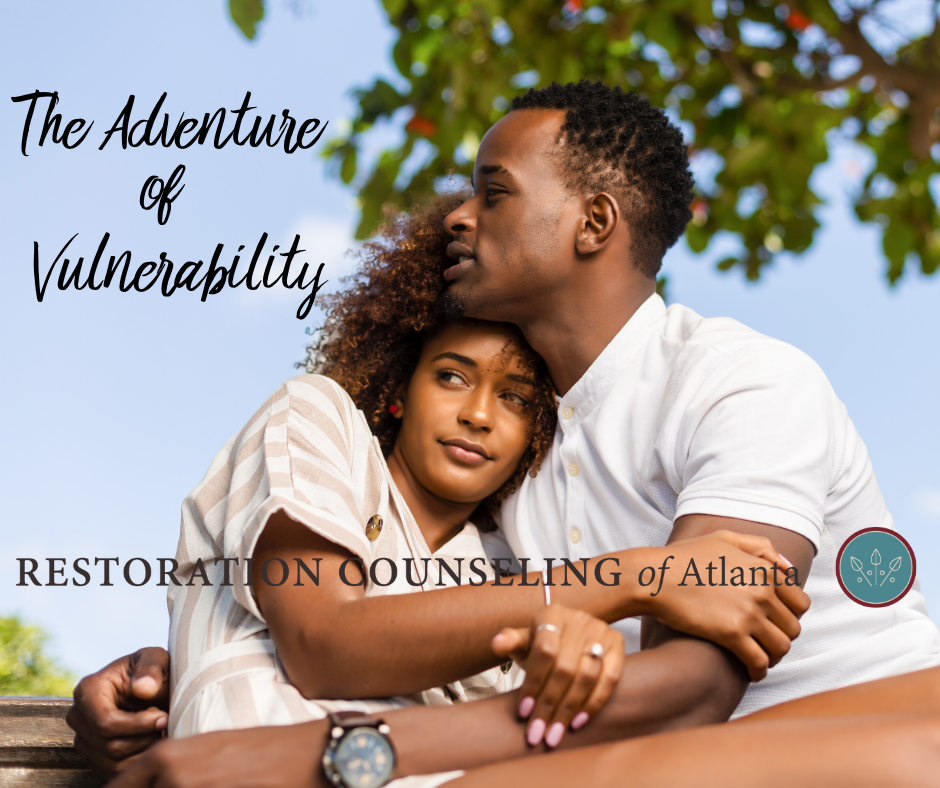Vulnerability – the Protagonist
If beautiful and satisfying lives have a protagonist, it is vulnerability. Vulnerability is the act of making your inner world known to others. It gives voice to fears and insecurities and shines a light on places of doubt and discouragement. It invites others into your holy of holies and reveals the broken but beautiful mess behind the curtain. I find myself thrilled and intimidated to write an article on vulnerability. It is thrilling because it is, in my opinion, the key to beautiful relationships. I am passionate about helping you understand the power of vulnerability. It is intimidating because this can radically change your life. I feel overwhelmed by the task. Enter our antagonist: shame.
Shame – the Antagonist
Shame takes all the lovely descriptors I used for vulnerability and flips them on their heads. It is rooted in feelings of worthlessness and tells us that we are not enough or too much. Shame yells loudly that you are ridiculous, that your emotions are silly, and that you are rotten to your core. It tells us that no one is interested in listening to us. We believe that no one likes us and that they won’t like us if we reveal any more about ourselves. Like any good antagonist, it jeers confidently at you, compelling you to stay within yourself. If you can just minimize the risks, stay quiet, and guard yourself against pain, you can survive, right?
In the brilliant words of Frank Herbert, “…Fear is the mind-killer. Fear is the little-death…” Shame will win if it can simply convince us to stay afraid. Its power grows and grows as long as vulnerability is ignored. Shame uses every tool it can: depression, anxiety, defensiveness, and criticism. It begs to keep the light away from the dark places of our soul. Shame believes that our story is one that deserves mockery, not empathy, contempt instead of grace. But in my 6 years of working in mental health, I am confident of one thing above all: people make sense in their context.
Consider the Context
I’ve worked in a mental health hospital and traveled to dozens of countries. I’ve worked with insecure teenagers and bitter old men. Time and time again, I see that people’s stories are beautiful, even in their brokenness. Never once, in the thousands of conversations I’ve had with clients have I thought, “How could you?” once they pull back the veil. Instead, when people are vulnerable, most of us can’t help but have empathy.
My primary goal as a counselor is to be shown into that sacred inner world that I might speak to the beauty I see: to validate the pain, but to remind them of the little boy or girl that once dreamed big and beautiful dreams. For the college student that is ashamed of his same-sex attraction, for the husband that is ashamed of his abuse, for the woman in her 50s that feels ignored and unseen, for the couple that feels desperately alone, to those that have given up the ideal hope of being cherished and loved, you are beautiful. Your story is one that is worth being told and it is in the telling that there is healing and an opportunity for something deeper, richer, and more meaningful.
Is vulnerability safe?
At this point, I want to validate that vulnerability is dangerous. It is scary because rejection means confirmation of our shame-filled narrative. I am not inviting you into painless relationships; I am instead inviting you into beautiful ones. Brene Brown has put into words my very same observations and has been at the front of the recent movement to understand and move towards vulnerability. She explains, “putting ourselves out there means there’s a far greater risk of feeling hurt.” But the alternative is to accept the mundane and disconnected life, to willingly accept a bleak and lonely existence. She continues, “I can honestly say that nothing is as uncomfortable, dangerous, and hurtful as believing that I’m standing on the outside of my life looking in and wondering what it would be like if I had the courage to show up and let myself be seen.”
Is everyone else brave?
It is fascinating to me that most are quick to recognize the courage in others that are vulnerable, but assume that their story is too dark or silly or shameful to speak of. And so we’ve arrived at the climax of our story, are you willing to move into a place of courage with the hope of a more abundant life? Is there a part of your soul that cries, “I want that!”? It’s scary and dangerous, but if this sounds like hope then, I want to provide an action step that has the potential to begin the change.
An Action Step to Change
It is not wise to offer your deepest inner self without choosing wisely who will be on the other side of all of this “openness”. I am not encouraging you to cast your pearls before swine. Instead, choose wisely by intentionally watching for responses of acceptance and kindness and intelligence when you observe group conversation and interpersonal relationships. Approach an individual slowly at first with simple revealing questions so that you can gauge the response that you might expect when you approach other, deeper issues or painful vulnerability. Allow some time to determine if that person will betray your trust, gossip, mock, or criticize before moving into those more significant places. And if they prove worthy, begin to build a trust that can carry you into those deeper conversations.
Worth the Risk
This is what I invite you into – risking the beautiful, painful, abundant life and rejecting the power and voice of shame. I am not trivializing this ask and I believe that this process must be gradual and intentional. I don’t believe that is safe to pursue vulnerability with everyone. But, if you consider for a moment all of your closest relationships and struggle to identify even one that is safe, perhaps it is the voice of shame and not wisdom that is speaking.
 Written by: Kyle Sussenbach, LAMFT
Written by: Kyle Sussenbach, LAMFT
Roswell location
kyle@restorationcounselingatl.com, ext. 117
Kyle is trained to work with individuals, couples, and families experiencing a wide range of issues including depression, anxiety, addictions, anger, suicidality, and relational distress. He also pursued further training related to sexual issues including shame, dysfunction, addiction, paraphilia, and trauma.
He is certified in PREPARE/ENRICH and is a Level 2 Gottman Method Couples Therapist. His primary focus is working with couples through relational and sexual difficulties. He is passionate about marriage and its purpose in sanctifying the couple and illustrating the relationship between Christ and the Church.

